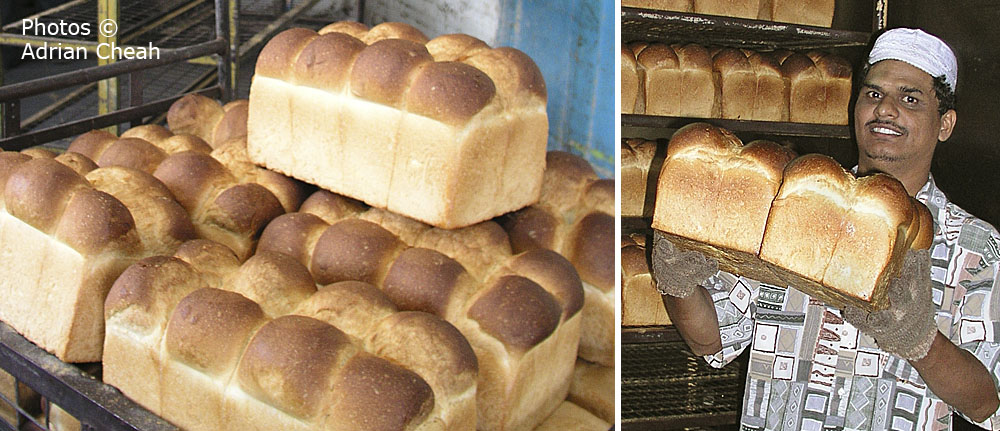"Roti! Roti!", the lure of the bread man

The 'roti man' or bread vendor is quite a common sight in Penang. They are usually on their rounds in the mornings and from tea time, plying their stock-in-trade in a road contraption that resembles a hybrid between a motorcycle and a 'meat safe'.

During my school days in the afternoons, I would wait patiently for the ‘ting ting ting’ sound (produced by striking a metal cup-like object with an iron rod) which signaled the arrival of the roti man. And when he did arrive, I’d rush out of the house, coins in hand, calling “Roti! Roti!” (Bread! Bread!). That was how the bread man was usually addressed.
My little hands would then frantically try to undo the catch on the little glass framed doors of the ‘meat safe’. The aroma of freshly baked bread, buns, cakes, candies and savoury snacks would waft out tantalisingly.
There were dozens of established bakeries in Penang, all owned by Indian Muslims catering to the 'roti man'. It was from these bakeries that bread vendors would pick up their supply of bread and snacks before proceeding with their rounds.

Benggali Roti anyone…
A popular item sold by the 'roti man' is Benggali Roti. It is white bread, freshly baked daily and sent out to most coffee shops around George Town. If you desire, the roti man will whip out his board, cut the Benggali Roti into a few slices and then spread a thick layer of the delicious 'kaya' (coconut jam) and margarine on it.
Benggali Roti actually derived its name from the word 'Penggali' which means ‘shareholders' in Tamil. In 1932, Sheik Mohd Ismail, an Indian Muslim from Madras, relocated to Penang to pursue a better livelihood. As soon as he settled down in George Town, he set up a business with his group of friends and called the co-op – ‘roti penggali'.
Local residents mistook the word ‘penggali’ for ‘Benggali’, a local label for north Indians. The name of the bread, therefore, became ‘roti benggali', and it has stuck since. In 1964, the bakery was renamed ‘Ismalia Bakery' from ‘Penggalis'.
Ismalia Bakery closed down and in 2005, Maliia Bakery moved into the building and brought with it a rich history of bread-making while continuing the tradition of making Penang’s best-loved bread.

Benggali Roti best served with…
My late dad lived to eat. He taught us to appreciate the simple pleasures in life. He would prepare breakfast most mornings. One of my favourites has to be Benggali roti with thick chicken curry and potatoes, always served hot with a pot of rich aromatic kopi-o (local black coffee) to complete a satisfying feast. Even as I write this, it makes my mouth water. You would be surprised if you knew how fast we consumed those loaves of benggali roti.

I enjoy the bread with kaya as well. Toast the bread till golden and crispy. Apply butter immediately followed by a generous helping of homemade kaya. Consume it straight away while it is hot. Every bite will be sinfully delicious.
If you frequent the 'sup kambing', 'sup ayam' and 'roti canai' stalls at the end of Penang Road, you would have sampled the soup served with Benggali Roti. It is an experience to dine al fresco along Penang Road in the evenings, sipping 'teh tarik' (pulled tea), tearing chunks of Benggali Roti and dunking piece after piece in the spicy 'sup kambing'.
Will the roti man survive the stiff competition in modern times, adapt or become a remnant of the past? Only time will tell. But today in Penang, there are quite a few of them still around, roaming the streets of George Town, peddling their ware. And like the trishaws and hawker stalls that make Penang unique, they form an integral part of the island’s cultural fabric.
-------------------------------------
Written and photographed by Adrian Cheah
© All rights reserved
Updated 23 June 2021